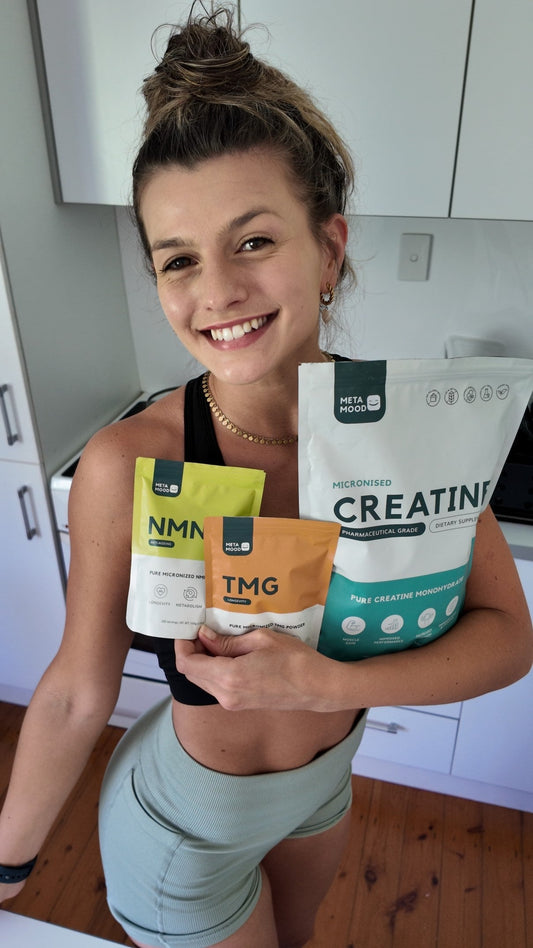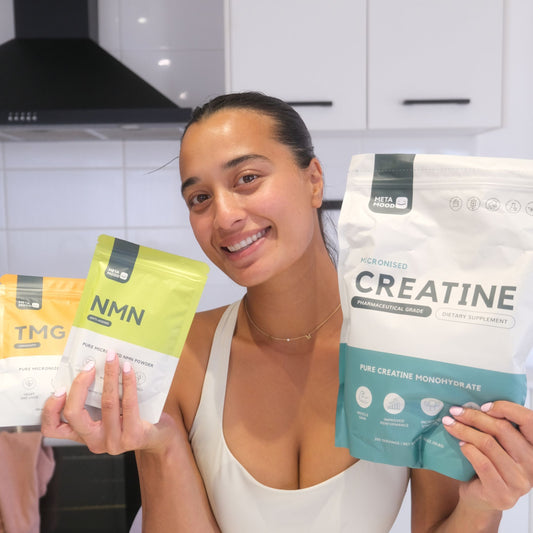If you’ve started taking NMN (Nicotinamide Mononucleotide) to boost energy, improve recovery, or support healthy ageing, you’ve probably heard about combining it with TMG (Trimethylglycine). Is pairing TMG and NMN essential, or just beneficial? The short answer: it's not mandatory, but it often enhances NMN’s benefits. Let's explore the science behind this combination, who it benefits the most, and whether you should include TMG in your longevity supplement routine.
What is TMG, and Why Is It Important?
TMG, or Trimethylglycine, naturally occurs in foods like beets, spinach, and quinoa. These and other food sources are rich in TMG. In your body, TMG functions as a methyl donor, meaning it provides methyl groups essential for critical cellular processes, such as:
-
DNA repair and regulation
-
Liver detoxification
-
Neurotransmitter synthesis (serotonin, dopamine, norepinephrine)
-
Hormonal balance
-
Homocysteine metabolism and heart health
Research highlights that maintaining optimal methylation through compounds like TMG supports stable physiological function, essential for overall health and vitality (PMC). Research also shows that taking TMG plus creatine can boost your strength and energy.
TMG Benefits
Because of its fundamental role in methylation, TMG offers a wide range of health benefits that go beyond cellular maintenance. By supporting neurotransmitter production and hormone regulation, TMG may enhance mood, mental clarity, and emotional resilience. Its ability to reduce homocysteine levels has also been linked to improved cardiovascular health and reduced risk of inflammation-related disease.
In addition, TMG is especially beneficial when taken alongside NMN. As NMN boosts NAD⁺ levels, it increases the body’s demand for methylation to process excess nicotinamide. TMG helps replenish these methyl groups, preventing potential imbalances. This combination supports sustained cellular energy, healthy metabolism, and optimal cognitive performance.
The Role of NMN in Cellular Health
NMN boosts NAD+ (nicotinamide adenine dinucleotide), crucial for cellular energy, DNA repair, and overall longevity. NAD+ naturally declines with age, contributing to lower energy, cognitive decline, and faster cellular ageing.
NMN supplementation raises NAD+ levels, supporting mitochondrial health and efficiency—vital in energy-intensive organs like the brain, heart, and muscles. However, NMN supplementation produces nicotinamide (vitamin B3), a byproduct that must be effectively processed and cleared by the body (Nature).
Why Pair NMN with TMG?
Processing nicotinamide heavily depends on methylation pathways. When these pathways function optimally, nicotinamide clearance is smooth. However, increased NMN intake can stress these pathways, particularly in individuals with impaired methylation due to genetic factors, lifestyle, or diet, potentially leading to:
-
Reduced NMN effectiveness
-
Neurotransmitter imbalances
-
Increased homocysteine (linked to cardiovascular disease)
-
Fatigue, mood swings, or cognitive fog
TMG supplements methyl groups, preventing depletion of your methylation system when taking NMN regularly, thereby ensuring continuous cellular efficiency and optimal benefits from your NMN regimen (PMC).
Who Should Consider TMG Supplementation?
1. Regular NMN Users or High-Dose Intake
If you take NMN consistently (500-1000 mg daily or more), your methylation demands increase, making TMG beneficial to maintain balanced methylation and continuous NAD+ replenishment.
2. Individuals with Methylation Imbalances or MTHFR Mutations
Up to 40% of the population has genetic variants (like the MTHFR mutation) reducing their methylation efficiency. Symptoms might include chronic fatigue, difficulty handling stress, or sensitivity to B vitamins. For these individuals, TMG becomes crucial to support efficient NMN metabolism and overall methylation balance (PMC).
3. Cardiovascular Health Enthusiasts
Elevated homocysteine, a consequence of impaired methylation, increases risks of heart disease, arterial stiffness, and cognitive decline. TMG significantly reduces homocysteine by converting it to methionine, promoting cardiovascular and overall longevity benefits (PMC).
4. Those Seeking Enhanced Mood and Mental Clarity
Since methylation affects neurotransmitter synthesis, reduced methylation capacity can negatively impact mood, focus, and clarity. Supplementing TMG can restore balance, improving emotional resilience and mental performance, especially beneficial when combined with regular NMN use (PMC).
5. Longevity-Focused Individuals
Optimising methylation alongside NMN supplementation ensures that your cells utilise and recycle NAD+ efficiently, supporting long-term cellular health and functionality. This balanced approach prevents potential negative feedback loops and supports sustainable NAD+ metabolism (Nature).
 How to Combine TMG with NMN Effectively
How to Combine TMG with NMN Effectively
-
When: Take TMG in the morning, ideally alongside NMN. It's well-tolerated on an empty stomach.
-
Dosage: Common doses range from 500–2000 mg daily, adjusted according to individual genetic, dietary, and health conditions.
-
Tolerability: Generally well-tolerated; start with a lower dose and gradually increase if sensitive.
TMG can be effectively combined with other methylation-supporting nutrients such as methylfolate (active folate) or methylcobalamin (active vitamin B12), depending on individual needs and genetic profiles.
The Best NMN Supplements and Best TMG Supplements
Choosing the right forms of NMN and TMG—and ensuring they’re high quality—can significantly influence how effective your supplement routine is. With a growing market of longevity supplements, not all products are created equal. Here’s what to consider when selecting NMN and TMG supplements:
NMN: Bioavailability and Form Matters
Not all NMN supplements are absorbed equally. The delivery method affects how much NMN reaches your bloodstream and ultimately boosts your NAD levels.
-
Sublingual NMN: Placed under the tongue, this form allows NMN to bypass the digestive tract and enter the bloodstream more efficiently. It’s often favoured for its rapid absorption and potency.
-
Capsule or Tablet: These are widely available and convenient but may be subject to degradation in the gut, reducing effectiveness unless formulated for extended release or intestinal absorption.
-
Liposomal NMN: Encapsulated in lipid spheres, this form offers improved bioavailability and protection from stomach acid.
-
Powdered NMN: Offers flexibility in dosing and is often more cost-effective, but absorption can vary depending on how it’s consumed.
When selecting an NMN supplement:
-
Check for purity: Aim for ≥99% pure NMN.
-
Third-party testing: Look for brands that publish lab results verifying quality, potency, and absence of contaminants.
-
Avoid unnecessary fillers: Ingredients like silica, magnesium stearate, or binders can dilute the active compound.
-
Packaging matters: NMN is sensitive to moisture and heat—ensure your supplement comes in airtight, light-resistant containers and is stored in a cool environment.
TMG: Types and Supporting Ingredients
TMG, also known as betaine, comes in a couple of different forms:
-
Trimethylglycine anhydrous: The standard form for methylation support, typically used in clinical studies and supplements.
-
Betaine hydrochloride (HCl): Sometimes marketed as TMG, but primarily used to support stomach acid. This form is not recommended for methylation support and can cause acid-related discomfort in some individuals.
Tips for selecting TMG:
-
Look for "TMG (Trimethylglycine)" or "Betaine Anhydrous" on the label to ensure you're getting the correct form.
-
Non-GMO and allergen-free certifications can indicate better manufacturing practices.
-
Consider formulas that include synergistic nutrients like methylfolate (5-MTHF) or methylcobalamin (B12) if you suspect broader methylation challenges—but always consult a health professional before combining active methyl donors.
Making informed choices about supplement form and quality ensures that your NMN and TMG stack delivers the benefits you’re aiming for—without compromising safety or effectiveness.
Practical Timing and Stacking
For optimal results, take both NMN and TMG in the morning, ideally at the same time. This supports your natural circadian rhythm and ensures energy and methylation support throughout the day. While NMN is often taken on an empty stomach, TMG may be better tolerated with food, especially at higher doses.
If you are stacking other supplements like resveratrol or B vitamins, you may want to coordinate timing based on your specific formulation and health goals.
Always follow the dosage recommendations provided by your supplement manufacturer, and consult with a healthcare provider if you are taking medications, managing chronic health conditions, or considering higher doses. Personalised dosing based on genetic testing or biomarker tracking (such as homocysteine levels) may provide additional insight into your optimal ratio.
Final Thoughts
Pairing TMG with NMN isn't essential for everyone, but it provides substantial benefits, particularly for those regularly supplementing with NMN, individuals with genetic methylation challenges, or those seeking enhanced cardiovascular, cognitive performance, and overall longevity support. By understanding your body’s methylation needs and optimising your supplement routine accordingly, you can significantly enhance the benefits of NMN, ensuring comprehensive support for long-term health and vitality.
Frequently Asked Questions
What supplements should I take with TMG?
TMG is often taken alongside methylation-supportive nutrients like methylfolate (B9), methylcobalamin (B12), and vitamin B6, especially for those with methylation challenges. It's also commonly paired with NMN to support NAD⁺ metabolism and prevent methyl group depletion.
Who shouldn't take TMG?
People with bipolar disorder, certain cancers, or excessive methylation activity should avoid TMG unless advised by a healthcare provider. Those taking medications that affect methylation or folate metabolism should consult a professional before use.
Does TMG raise testosterone?
TMG does not directly raise testosterone, but by supporting methylation and reducing homocysteine, it may indirectly contribute to hormonal balance and overall vitality, which can influence testosterone regulation.
Does TMG cause anxiety?
In some sensitive individuals, especially at high doses or when combined with other methyl donors, TMG may overstimulate the nervous system and contribute to anxiety or irritability. Starting with a lower dose and monitoring effects is recommended.
Does TMG help your liver?
Yes, TMG supports liver function by aiding in fat metabolism and assisting in the conversion of homocysteine to methionine, which helps protect liver cells and may reduce the risk of fatty liver disease.
Does TMG reduce inflammation?
TMG may help reduce inflammation by lowering homocysteine levels, which are linked to systemic inflammation and cardiovascular risk. Its role in supporting healthy methylation also contributes to improved cellular function and repair.
Does TMG promote muscle growth?
While TMG is not a direct muscle-building supplement, it may support performance and recovery by enhancing methylation, aiding in protein synthesis, and helping regulate hormones involved in muscle maintenance.
References
-
Craig, S.A. (2004). Betaine in human nutrition. American Journal of Clinical Nutrition, 80(3), 539-549. PMC
-
Yoshino, J., Baur, J.A., Imai, S.I. (2018). NAD+ intermediates: The biology and therapeutic potential of NMN and NR. Cell Metabolism, 27(3), 513-528. Nature
-
Lynch, B.J., & Haggarty, P. (2018). DNA methylation and methyl donor availability in chronic diseases. Nutrients, 10(10), 1403. PMC
-
Dayal, S., & Lentz, S.R. (2012). ADMA and hyperhomocysteinemia. Vascular Medicine, 17(2), 71-77. PMC
-
Oulhaj, A., Refsum, H., Beaumont, H., Williams, J., King, E., Jacoby, R., & Smith, A.D. (2016). Homocysteine as a predictor of cognitive decline. Journal of Alzheimer's Disease, 52(1), 45-58. PMC




